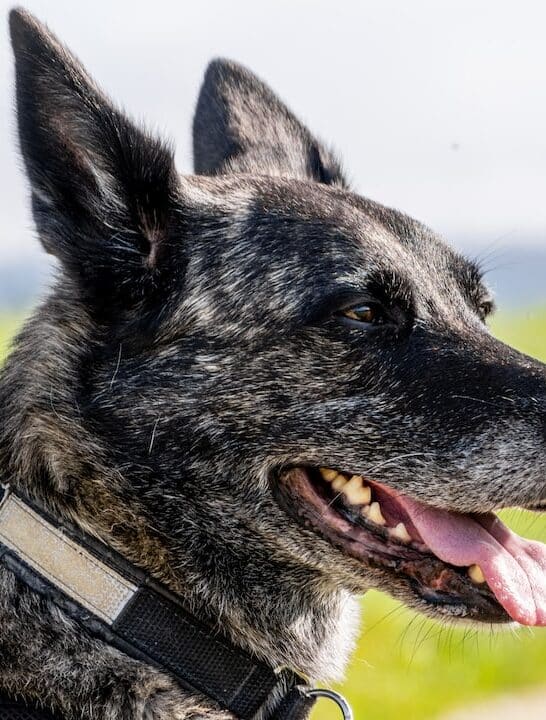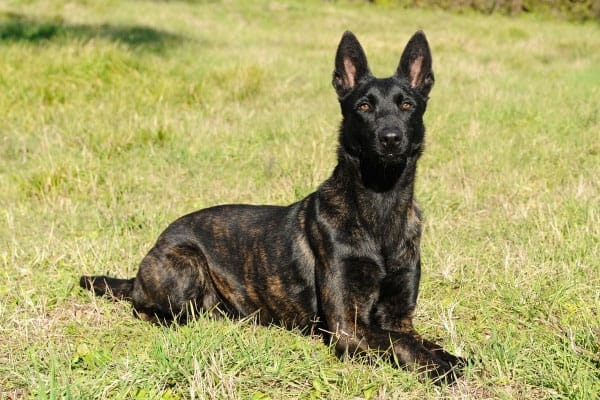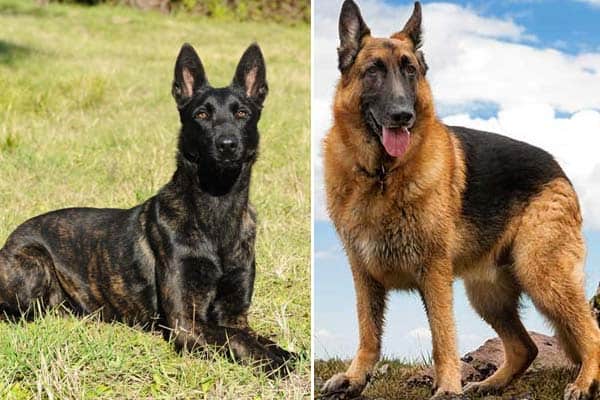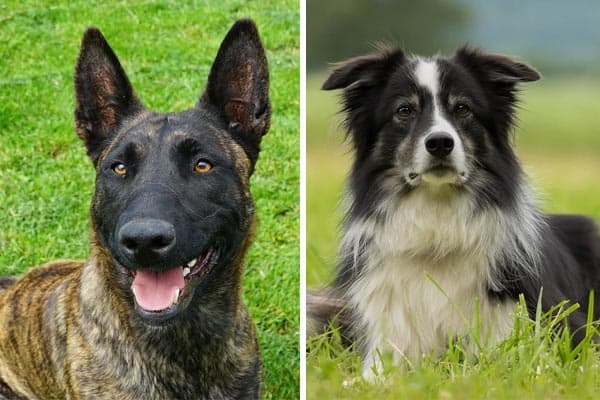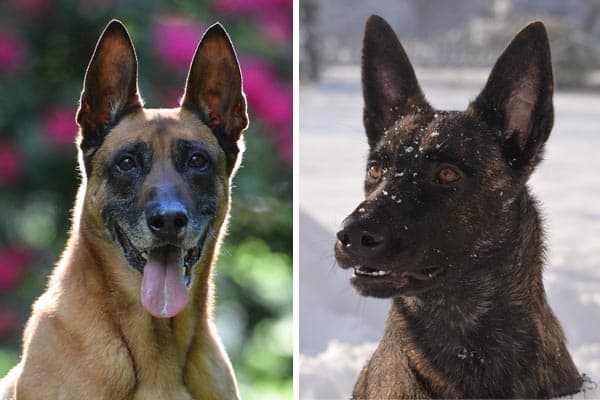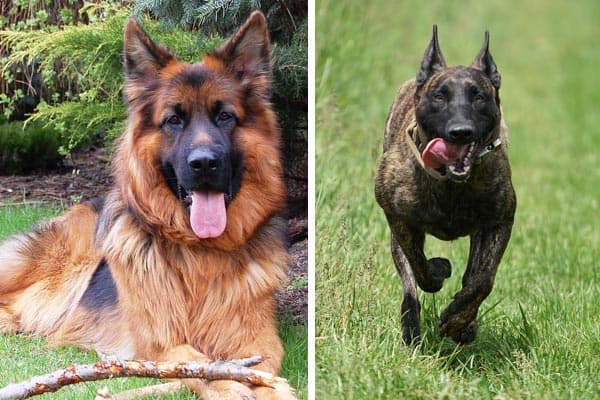Do Dutch Shepherds Howl: Learn All About Dutch Shepherds and Noise
Think back to the first time you ever saw a Dutch Shepherd dog. Did you think you were looking at a wolf? Or perhaps a wolf-dog hybrid?
These sleek and slender dogs, with their alert, perked ears and long thin tails and endless legs do look a lot more like their wild ancestors than so many modern dog breeds today!
And if there is one thing that wild wolves are known for, it is their signature howling calls. So it just makes sense that you might wonder if the Dutch Shepherd dog howls too.
Do Dutch Shepherds howl? Let’s hear what Dutch Shepherd breeders, owners, and dog experts have to say on this important topic.
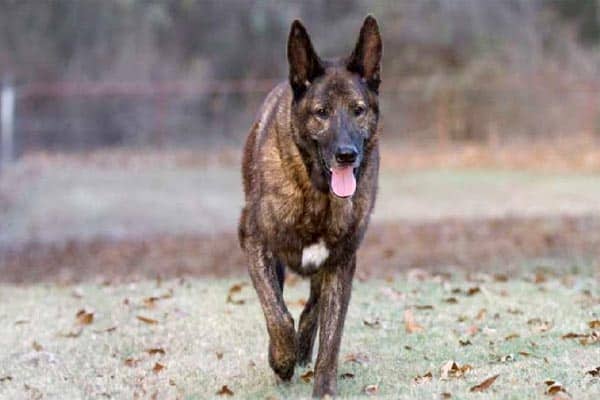
Yes, Dutch Shepherd Dogs Have Been Known to Howl
All it takes is a glance at this popular Dutch Shepherd owner forum to learn that yes, Dutch Shepherd dogs do have a tendency to howl.
However, the good news here is that Dutch Shepherds as a general rule are not noisy dogs. They will vocalize when they decide it is necessary for some reason, whether that is to protect against a threat, alert you to a change in the environment or let you know how they are feeling.
For example, many new Dutch Shepherd owners learn that very first night of crate training that their new pup is perfectly capable of howling their head off.
Puppies of any dog breed do tend to be vocal, primarily because their voice is the only real communication tool they know how to use to “talk” to their people. But as a dog grows up and goes through training, the vocalization tends to taper off.
For Dutch Shepherds, once they get established with a consistent, positive training program, these dogs will learn when to use their voice and will naturally become less vocal.
Listen to a Dutch Shepherd Dog Howling
This short video taken by a Dutch Shepherd dog owner highlights the howling voice of an adult Dutch Shepherd.
In this video, the dog is howling back at the siren of a fire truck, but Dutch Shepherds have been known to howl back at wolves, other dogs, and even canines on television.
Why Do Dutch Shepherds Howl?
As the American Kennel Club (AKC) points out, the Dutch Shepherd is a natural dog breed.
What does this mean? It means that this dog breed evolved over time without a lot of direct-controlled breeding by humans. In fact, this dog breed was “discovered” rather than deliberately bred.
The Dutch Shepherd first got its start in the place where it takes its breed name from – The Netherlands. These dogs have a long history of serving as guard and herding dogs and protection dogs for farmers, ranchers, shepherds, and their animals.
As a natural breed that has always worked and was not bred to be a companion (pet) dog, per se, the Dutch Shepherd has retained the high prey drive, high energy levels, and high protection instincts of a true working dog.
Whether the Dutch Shepherd’s howl is a part of that same suite of working dog traits or it is a learned behavior (as some owners believe) will likely always produce lively debates.
Some Dutch Shepherds do not howl ever or will do so only rarely. Others seem to prefer howling to barking as a communication tool. A well-trained Dutch Shepherd will typically do little of either unless there is a need to issue an alert.
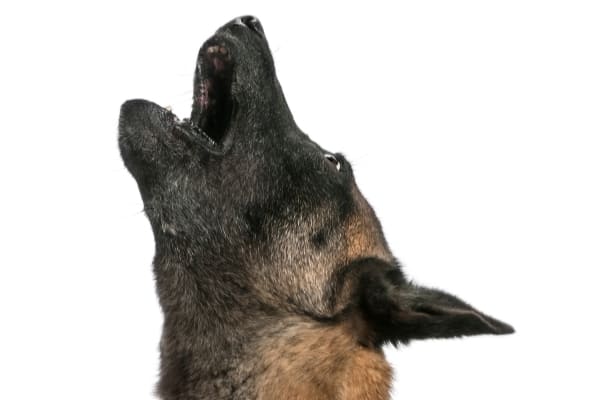
When Howling Becomes a Problem Behavior in a Dutch Shepherd Dog
Dutch Shepherd dogs are definitely not your “typical” companion canine. This dog breed is a working breed through and through and is only recommended for informed, aware, and experienced dog handlers and trainers.
Because the Dutch Shepherd’s incredibly high prey and protection drive and energy level can often be too much for the unwitting owner, Dutch Shepherds are frequently relinquished and rehomed.
As the North American Dutch Shepherd Rescue (NADSR) charity explains, Dutch Shepherds absolutely need firm, consistent, ongoing, and positive training and socialization to succeed in pet life.
Furthermore, as the official dog breed club, the American Dutch Shepherd Association (ADSA) explains, there is a critical time period in a puppy’s life when they need a particular kind of socialization.
Puppies that do not get adequate exposure to strange people, strange situations, and unknown animals in the first 20 weeks of life may grow up to develop fearful or aggressive behaviors or both.
A Dutch Shepherd that feels fearful or aggressive will often vocalize excessively by barking and/or howling.
As All Shepherd Rescue points out, Dutch Shepherds that are not properly crate trained or are abused, neglected, or abandoned or taught using negative (punishment-based) training methods may also develop aggression and separation anxiety that manifests in constant barking and howling.
Another common reason why Dutch Shepherd barking and howling can become a problem is when a dog doesn’t get enough activity and exercise and is bored. Dutch Shepherds are very intelligent. These dogs need to exercise both their body and their mind.
A Dutch Shepherd that doesn’t have a job to do is going to find an outlet for all that natural energy and drive. It may come out as barking or howling, or remodeling your furniture or digging up your lawn or another undesirable activity.

How to Control a Howling Dutch Shepherd Dog
As WebMD for Pets highlights, howling is a way that your dog can “talk” to you.
The Dutch Shepherd as a breed is known to be independent and sometimes willful or stubborn. This is part of the breed makeup and is useful when a dog is out miles from their human work partner herding livestock and protecting them from predators.
It isn’t so useful when the mailperson drops the mail off and your Dutch Shepherd howls loudly enough for them to hear it back at the central mail depot!
But, when you put it in context, perhaps it makes perfect sense to your dog to howl at you when someone approaches.
The first step to controlling and stopping your Dutch Shepherd howling is to stop and consider why your dog is howling.
Dogs typically howl for these types of reasons:
- To send you a message.
- To get your attention.
- To let everyone know their location.
- To find out your location.
- To respond to other sounds (such as the fire engine siren from the video here earlier).
Dogs can also howl for these reasons:
- They are bored.
- They are scared.
- They are lonely.
- They feel threatened.
- They don’t feel well.
- They have separation anxiety.
Once you have identified the main reasons that seem to provoke your Dutch Shepherd to start howling, this gives you enough information to start teaching your dog to do something different in those types of situations.
It is also smart to take your dog in for a veterinary appointment just to be sure there is nothing medically wrong.
Dutch Shepherd dogs are definitely dogs that require very thorough, specific types of training to learn how to live in a family as a companion canine.
For this reason, one of the best natural ways to control howling is simply to give your Dutch Shepherd a job to do that will tire them out fully. Canine agility, athletic competitions, tracking or nose work, and other “jobs” can keep your dog too exhausted and contented to howl.
























